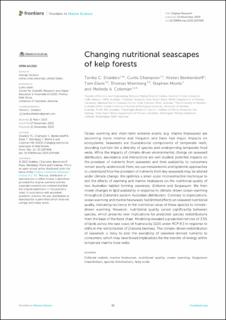| dc.contributor.author | Shalders, Tanika C. | |
| dc.contributor.author | Champion, Curtis | |
| dc.contributor.author | Benkendorff, Kirsten | |
| dc.contributor.author | Davis, Tom | |
| dc.contributor.author | Wernberg, Thomas | |
| dc.contributor.author | Morris, Stephen | |
| dc.contributor.author | Coleman, Melinda A. | |
| dc.date.accessioned | 2024-01-11T09:10:52Z | |
| dc.date.available | 2024-01-11T09:10:52Z | |
| dc.date.created | 2023-12-20T13:10:19Z | |
| dc.date.issued | 2023 | |
| dc.identifier.citation | Frontiers in Marine Science. 2023, 10 . | |
| dc.identifier.issn | 2296-7745 | |
| dc.identifier.uri | https://hdl.handle.net/11250/3111015 | |
| dc.description.abstract | Ocean warming and short-term extreme events (e.g. marine heatwaves) are becoming more intense and frequent and have had major impacts on ecosystems. Seaweeds are foundational components of temperate reefs, providing nutrition for a diversity of species and underpinning temperate food webs. While the impacts of climate-driven environmental change on seaweed distribution, abundance and interactions are well studied, potential impacts on the provision of nutrients from seaweeds and their availability to consumers remain poorly understood. Here, we use metabolomic and lipidomic approaches to understand how the provision of nutrients from key seaweeds may be altered under climate change. We optimize a small-scale microextraction technique to test the effects of warming and marine heatwaves on the nutritional quality of two Australian habitat-forming seaweeds; Ecklonia and Sargassum. We then model changes in lipid availability in response to climate-driven ocean warming throughout Ecklonia’s eastern Australian distribution. Contrary to expectations, ocean warming and marine heatwaves had limited effects on seaweed nutritional quality, indicating resilience in the nutritional value of these species to climate-driven warming. However, nutritional quality varied significantly between species, which presents new implications for predicted species redistributions from the base of the food chain. Modelling revealed a projected net loss of 3.5% of lipids across the east coast of Australia by 2100 under RCP 8.5 in response to shifts in the redistribution of Ecklonia biomass. The climate-driven redistribution of seaweeds is likely to alter the availability of seaweed-derived nutrients to consumers, which may have broad implications for the transfer of energy within temperate marine food webs. | |
| dc.language.iso | eng | |
| dc.title | Changing nutritional seascapes of kelp forests | |
| dc.title.alternative | Changing nutritional seascapes of kelp forests | |
| dc.type | Peer reviewed | |
| dc.type | Journal article | |
| dc.description.version | publishedVersion | |
| dc.source.pagenumber | 0 | |
| dc.source.volume | 10 | |
| dc.source.journal | Frontiers in Marine Science | |
| dc.identifier.doi | 10.3389/fmars.2023.1197468 | |
| dc.identifier.cristin | 2216365 | |
| cristin.ispublished | true | |
| cristin.fulltext | original | |
| cristin.qualitycode | 1 | |
